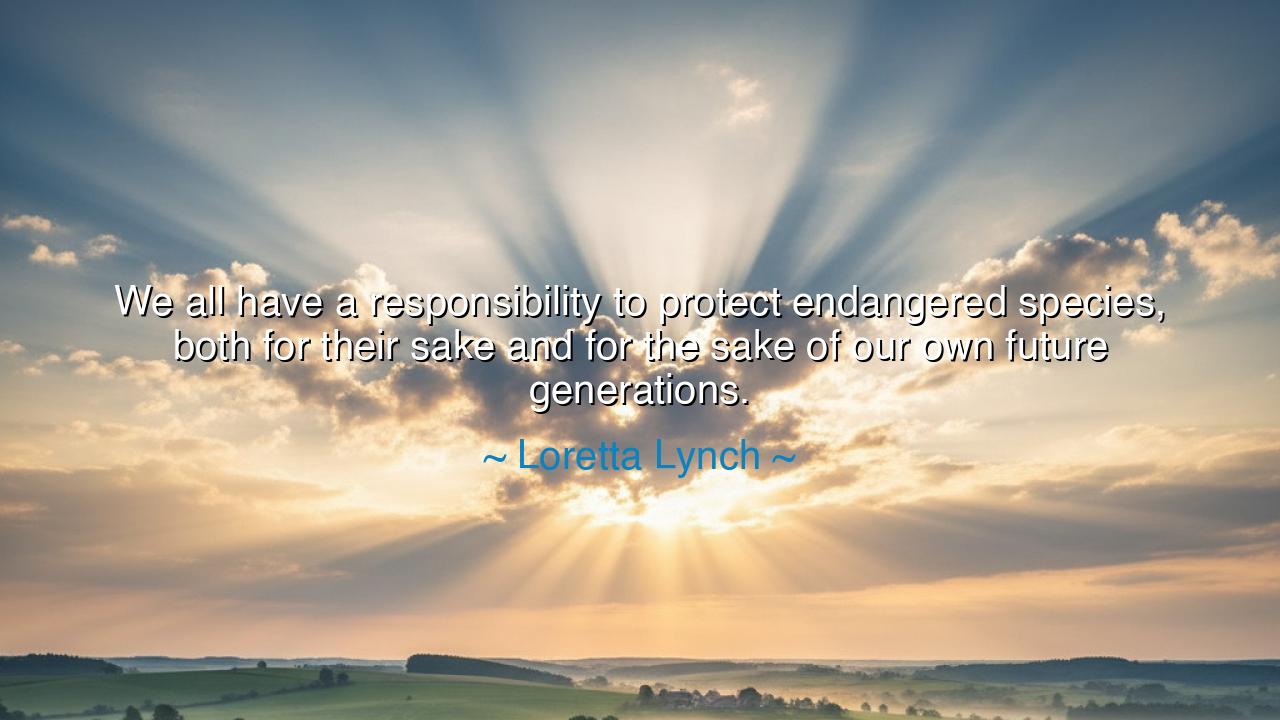
We all have a responsibility to protect endangered species, both
We all have a responsibility to protect endangered species, both for their sake and for the sake of our own future generations.






"We all have a responsibility to protect endangered species, both for their sake and for the sake of our own future generations," says Loretta Lynch, and with these words, she speaks to a profound and ancient truth—that the health of the Earth and the survival of its creatures are inextricably linked to our own fate. The wisdom of this statement calls forth the knowledge passed down through the ages, from ancient tribes to modern civilizations, that we are guardians of the world around us. As stewards of life, we must protect what is vulnerable, for to harm it is to harm ourselves.
In the earliest days of human existence, there were those who understood that the balance of nature was fragile. The Native American peoples, for example, lived by the guiding principle that all creatures—be they plants, animals, or humans—are part of an interconnected web of life. They believed that when one thread of that web is broken, the entire structure weakens. The wisdom of their ways reminds us that the extinction of species is not just a loss for those creatures alone; it is a loss for all of humanity. The ancient Greeks, too, understood this. Aristotle, in his great works, spoke of the natural world as a reflection of the divine order, and when that order is disrupted, so too is the harmony of the cosmos.
Consider the tragic tale of the dodo, once a bird of abundance on the islands of Mauritius. In the 17th century, the arrival of humans and their animals led to the dodo's demise, a story that echoes through time as a warning. The dodo’s extinction did not only mark the end of a species; it signified the fragile state of life on Earth, and how quickly that state could be changed by the careless actions of humans. The loss of the dodo is a reminder that when we fail to recognize our responsibility to protect life, we do not simply lose the creatures we fail to preserve, but we lose a part of ourselves—a part of the great tapestry of life.
In more recent times, the struggle to protect endangered species has grown ever more urgent. The elephants of Africa, once abundant across the continent, now face the threat of extinction due to poaching and habitat loss. The tiger, once a symbol of strength and majesty, now fights for its survival in dwindling forests. These creatures, and many others, are not just symbols of nature; they are integral parts of the ecosystems that sustain life. Their loss would mean more than the loss of beauty or majesty—it would be the collapse of entire ecosystems upon which we depend. When we fail to protect them, we endanger the future of all life, including our own.
Loretta Lynch’s call for responsibility is a reminder that protecting endangered species is not an act of charity but one of self-preservation. The natural world does not exist for our use and exploitation alone. We share this world with millions of other species, all of whom play their part in sustaining the balance of life. The ancient philosophers spoke of the importance of living in harmony with nature. Confucius taught that wisdom lies in understanding our place within the natural order, while Hindu philosophy calls upon us to live with respect for all life forms. These teachings are not just relics of the past—they are calls to action for the present, urging us to protect the creatures that sustain our world.
The lesson here is clear: we are the stewards of this Earth, and with that role comes immense responsibility. It is not enough to enjoy the fruits of nature—we must also nurture it. This is a challenge for each of us, whether it is through supporting conservation efforts, advocating for policy changes, or simply living with greater awareness of the impact we have on the world around us. Every choice we make, from what we consume to how we treat the land, contributes to the legacy we leave behind.
Thus, the practical wisdom we should take from Loretta Lynch’s words is this: commit to living as a guardian of the Earth. Protect endangered species, support conservation efforts, and recognize that the well-being of nature is directly tied to our own. Teach future generations that the world is not an endless supply of resources to be consumed, but a living, breathing entity that must be cared for. Let our actions today reflect the understanding that preserving life is not just an act of kindness—it is an act of survival, both for the species we seek to protect and for humanity itself.






AAdministratorAdministrator
Welcome, honored guests. Please leave a comment, we will respond soon